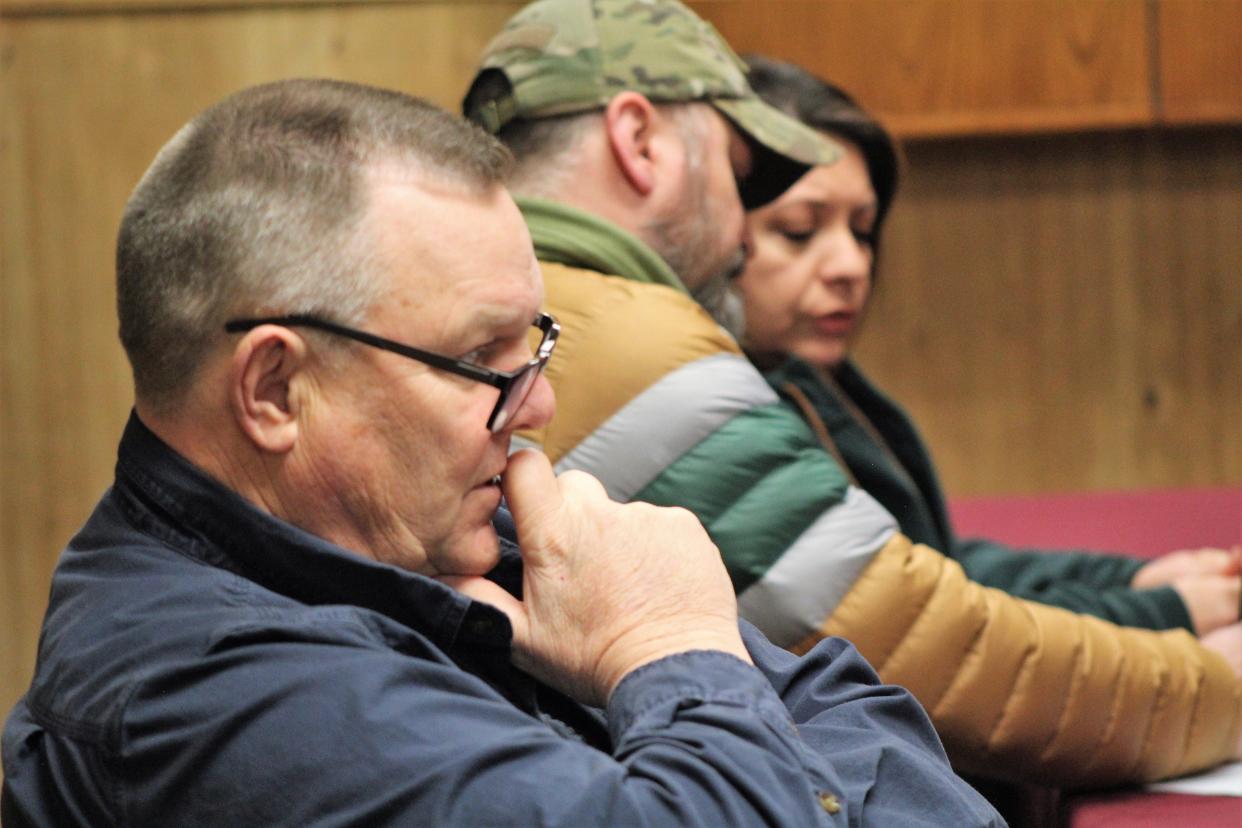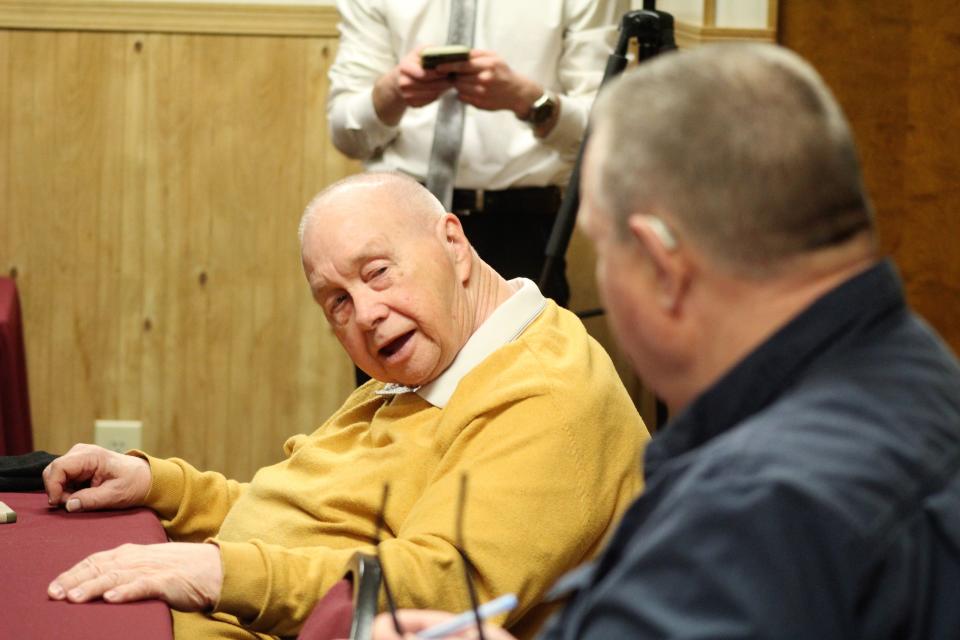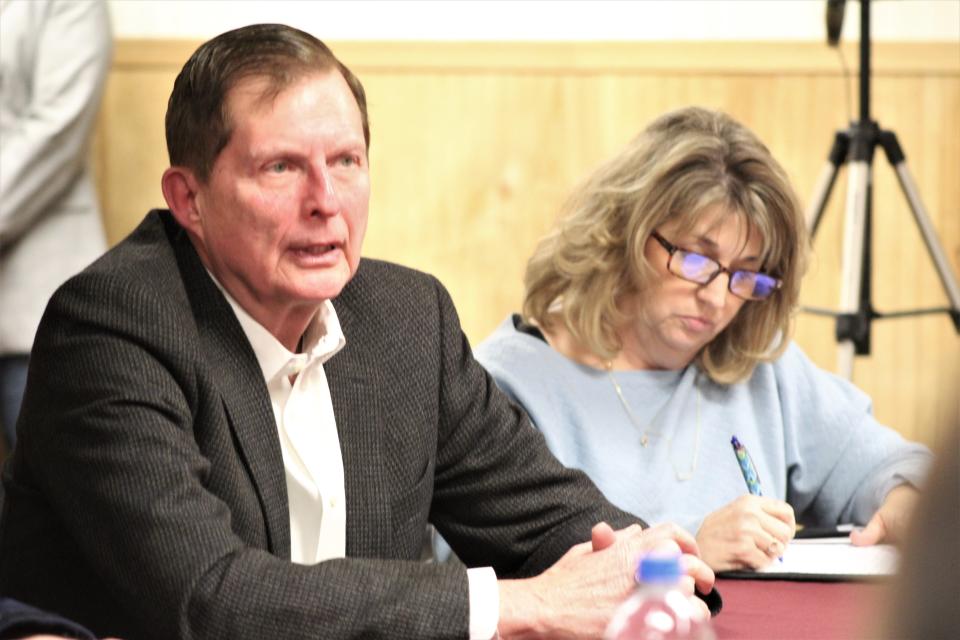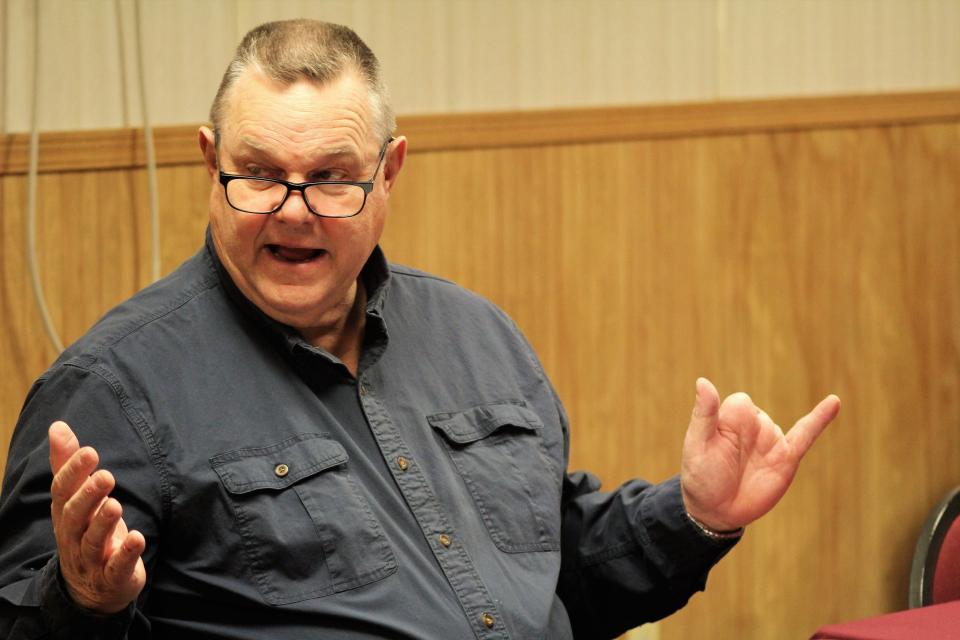Tester discusses 'alarming number of issues' with military healthcare

- Oops!Something went wrong.Please try again later.
In a roundtable meeting with Montana veterans, service members, and health care providers, Montana Senator Jon Tester heard a chorus of complaints about a military health care system that has become increasingly inefficient, unresponsive, and difficult to navigate, both for patients and their providers.
“I’ve heard from far too many Montanans that TriCare isn’t working for them, and I’m concerned about the alarming number of issues with the program,” Tester said in a news release in advance of the roundtable in Great Falls. “Federal government bureaucrats in Washington don’t understand the challenges these folks face when it comes to accessing those benefits in rural America, but together we’re going to make them understand and fix this.”
TriCare is the health care program offered by the U.S. Department of Defense (DoD) to military personnel, retired veterans, and their dependents. It was developed in the late 1980s in response to escalating medical costs, increasing paperwork demands and a general dissatisfaction with the existing DoD health care system that was developed in the 1950s.
According to the Congressional Research Service, TriCare health plans now serve approximately 9.6 million beneficiaries at a cost of around $55.8 billion annually – or about 7.2% of total DoD budget requests.
While TriCare may represent an improvement over health care options offered by the DoD in the 1950s, in recent years the program has begun to suffer the same criticisms that plagued the Cold War era health care system. The growing dissatisfaction with TriCare was brought into high relief in 2022 when the multi-billion-dollar pharmaceutical company Express Scripts announced plans to reduce the number of pharmacies in Montana and across the country where service members could obtain the prescriptions.
“The recent decision by Express Scripts…has the potential to drive as many as 15,000 community pharmacies out of the TriCare retail pharmacy network,” Tester wrote in a letter to Under Secretary of Defense Gilbert Cisneros. “As a result, approximately 400,000 beneficiaries could be forced to find a new pharmacy... and no longer able to rely upon their local pharmacy to access needed medications and in-person pharmacist counseling. That is unacceptable.”
Retired Air Force Master Sergeant Joe Fletcher told Tester about his struggles to obtain his prescription for Type II diabetes, a prescription he had been taking regularly for at least two years.

"About a month and a half ago I called in my refill, and I came up to Malmstrom to get it,” Fletcher said. “They said TriCare won’t let us fill it for you. Your doctor has to justify why he wants you to have this medication.”
Fletcher contacted his physician to request he send a written justification for the prescription – a justification that was promptly denied by TriCare, which demanded Fletcher switch to an alternate medication that was available at a lower price.
“I’ve been around government for longer than some of you have been on this earth,” Fletcher said in describing his frustration. “I know how things are done, and it bothers me to think that some general office clerk at TriCare or Express Scripts disapproved my doctor’s justification rather than it being done by a physician or a nurse."
“I found that the folks out at Malmstrom are pretty good at being very accommodating," he continued, "but when they tell me ‘This is what the rule is, and we can’t do it’ - that bothers me. The only question I asked the young guy out there is, how is my physician supposed to know that for me to continue getting the same medication I already had in the past, that he has to send a per-authorization request - and then it gets denied? Meantime what am I to do for the medication? Especially when I’ve got diabetes.”
The struggle to obtain medications through TriCare was not limited to Fletcher alone. Retired Brigadier General Brad Livingston spoke of a needlessly complicated procurement process that leaves both patients and health care providers scratching their heads, and the expanding number of private pharmacies unwilling to fill Express Scripts prescriptions because the process is so unwieldy.
“Doctors in this community and their staff are unfamiliar with how to get a prior authorization from Express Scripts,” Livingston said, “and honestly the staff at Malmstrom are not familiar with the program. They just do kind of the routine aspect of it, especially the billing and those things.”
Livingston noted that with 3,200 airmen and just as many military retirees in central Montana, the pharmacy at Malmstrom is now one of the largest in Montana. However, problems within that system has prompted many patients to seek their prescriptions elsewhere.
“Honestly, in this town right now the pharmacies are overwhelmed,” he said. “Pharmacies have become the shot provider for the community also, and it’s really, really tough on them. For a lot of us we just get our shots in town now. It’s just easier than going to Malmstrom, but now Smiths and Albertsons are not going to do it anymore. When you look at the number of pharmacies that have declined or who are not participating in the program, your pretty much down to CVS and Walgreens.”
“Then you’re back to Malmstrom,” Livingston continued, “and that’s just another workflow problem that comes down to the active-duty airmen there. Just like the civilian community they don’t have enough pharmacists and they don’t have enough pharmacy technicians. That’s the big issue right now.”

The frustration with TriCare extends beyond patients to include local health care providers as well. Alissa Engel is a licensed mental health care counselor who specializes in trauma, dissociative disorders and psychosomatic disorders, especially among active-duty service personnel and veterans. She said TriCare’s reimbursement rate is well below that of private insurance companies and working with them has become so cumbersome that most providers will no longer accept TriCare.
“My heart is with serving veterans, so I still accept TriCare and TriWest, but it has been a challenge,” Engel said. “I work in a group of 10 therapists. Most of them are on the ‘in network’ list, but they won’t take military personnel anymore. They (the therapists) are on the list holding a spot, but they can’t get paid, so they just say I’m not going to see military and veterans.”
“Even the ones that are ‘in network’ have gotten so frustrated that they just don’t take those clients anymore. Lack of payment, difficulty getting paid, the added paperwork that they require, where private insurance doesn’t ask anything extra.”
One of the greatest frustrations among medical providers is the slow pace of reimbursement. Engel said TriCare and the Veterans Administration typically take from 45 days to two months to pay for services rendered, and that the billing process is so complicated that she’s been forced to hire a billing professional just to handle her TriCare and VA accounts. The billing professional charges Engel 10% of her profits for the service.
“I used to do my own billing when I first started out, and for every other insurance company it was easy,” she said. “You just buy an online program; it costs about $89 a month and you do it yourself. Easy-peasy, and it pays you a third more and they don’t ask you for anything extra. With TriCare and the VA you’ve got to be very good at billing to get paid, and still their reimbursement takes forever.”
“It’s not an issue of we’ve got too many providers, it’s an issue of we don’t have enough,” Tester responded. “We’ve got 17 veterans a day as of the last census that are committing suicide, and Montana’s suicide rate is the highest in the nation. There’s not enough people out there to take care of the problem, so that when somebody is in crisis, they have no help. We don’t have enough providers that are available to get on board and when they do, they’re libel not to work because it takes 45 to 60 days or longer to get paid. This is insane.”
Adding to the complexity is an arcane, multi-tiered system negotiated between insurance companies, in which reimbursement rates are not shared publicly. The system leaves health care providers with no clear understanding of the amount of payment they can expect to receive for services rendered.
“When they switched over their contract (from TriWest to United Healthcare), at first they were making a good payment, but then they kind of bumped it down,” Engel said. “They do all this by negotiation, and we don’t get the fee schedule, so we really don’t know. They don’t tell us what we’re supposed to be getting paid for a couple of months after a contract shift. You couldn’t get anyone to answer the phone for three months – no providers, no billers, there was no answering machine, no email, no people, no callbacks.”

Tester’s regional director, Cheryl Ulmer, explained the impact of United Healthcare assuming control of the contract to provide health care services for military service members and their families.
“United Healthcare makes decisions on their own about what the reimbursement rate is going to be,” Ulmer said. “If they can make it at a lower reimbursement rate which costs the DoD less money – the Dod essentially pays the same but then it becomes pocket money for United Healthcare. So, DoD says they’ll pay $50 for a prescription, but United will only reimbursees the providers at $35 - so that $15 middleman money goes to United Healthcare.”
Vanessa Labarge, a licensed clinical professional counselor, and U.S. Air Force veteran lamented the utter lack of communication and cooperation from United Healthcare in resolving billing issues.
“Three months past the time when United Healthcare took over the contract, you might have had a billing with TriWest from last November or December which you hadn’t gotten paid for,” she said. “When you ask them why you’re not getting paid United Healthcare says ‘that’s not our problem anymore. That was a TriWest billing, and then there’s nobody at TriWest to go to.”
“The agreements that you guys had when you served was you were going to get healthcare, and it’s not working that way,” Tester told the members of the roundtable. “There’s a bunch of work that we need to do on this – I know there is. I just want to hear it from you guys to find out where exactly we need to apply the pressure.”
This article originally appeared on Great Falls Tribune: Tester discusses broken military healthcare system at local roundtable

